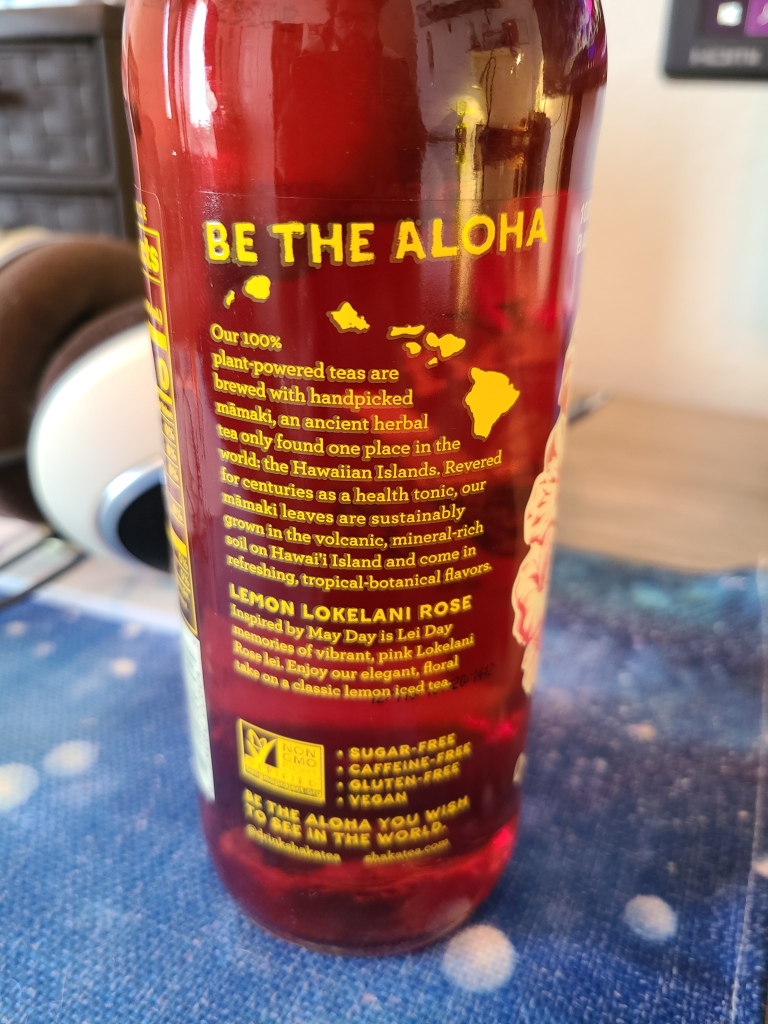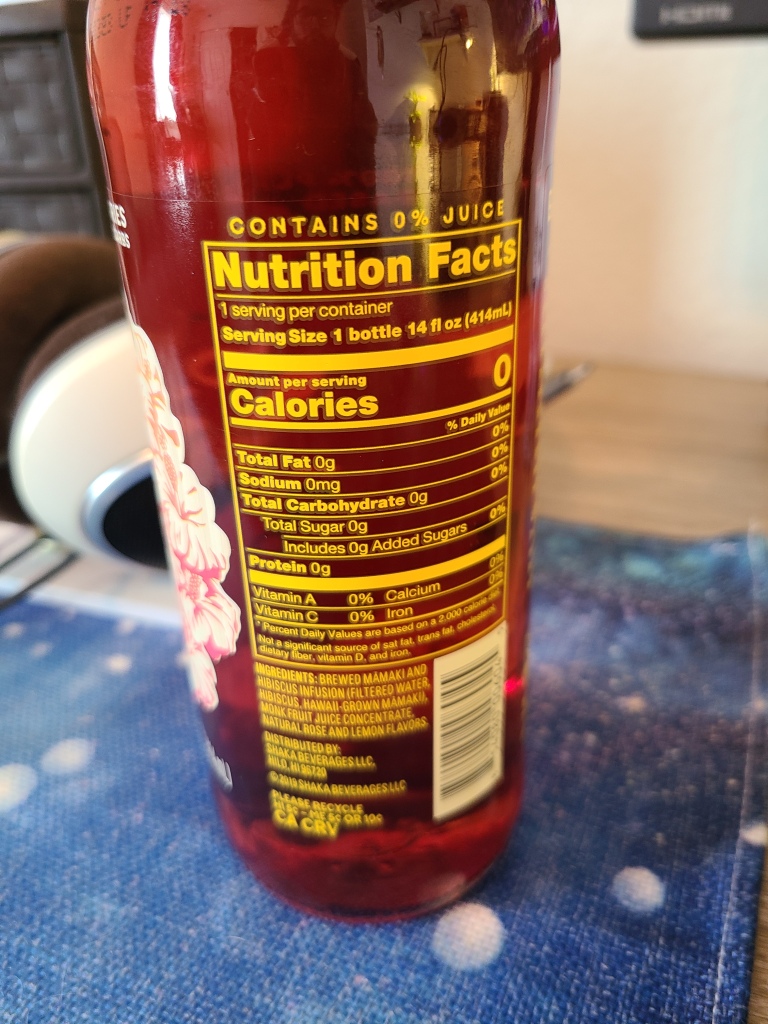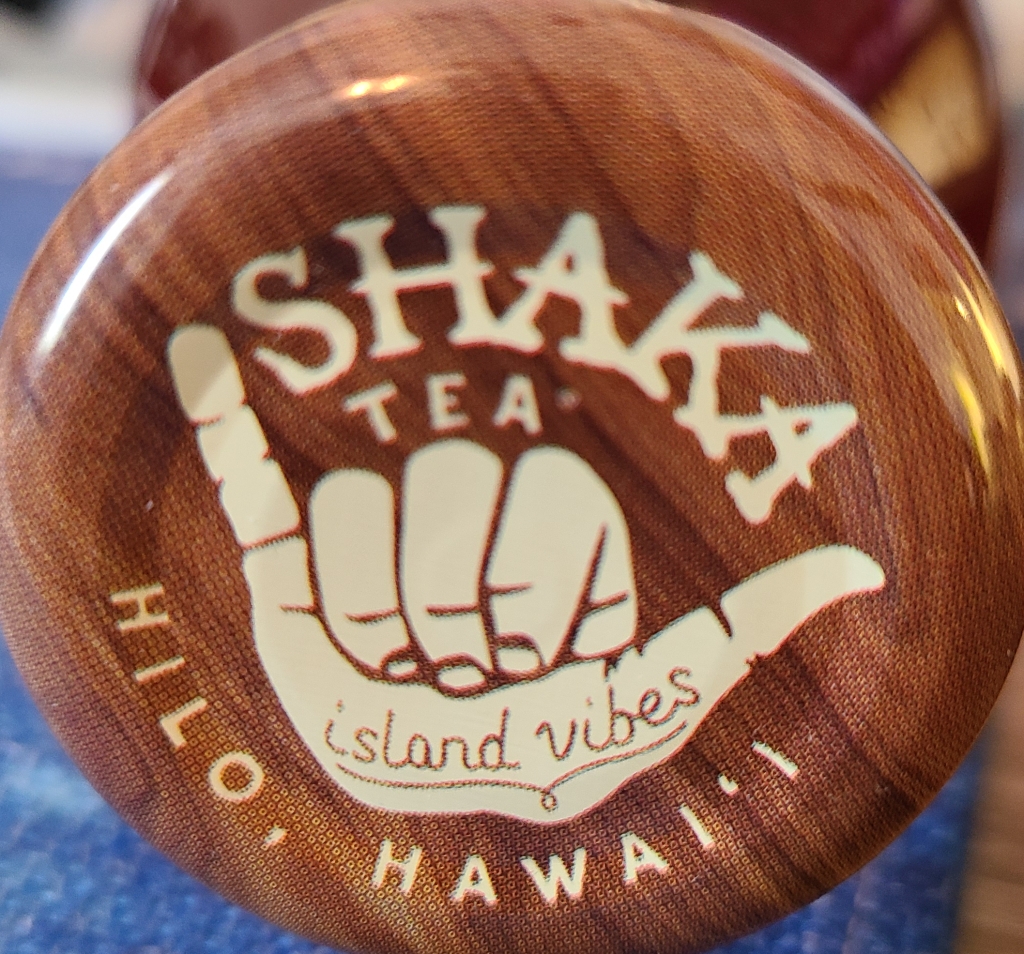Today I want to review Shaka Tea Hawaii. I have been spoiled by loose leaf teas and matchas, which means it is hard to find a good grocer tea. How good was this tea? Is it finally the one that I am addicted too? lets find out.
Packaging.

One thing that I give in favor of the packaging of this product instantly is the aesthetics. The logo is beautiful and it complements the color of the tea so beautifully. It lets the consumer see the beauty of the drink and assess the quality before buying. As you can see this is a rose tea, so getting to see that rose tea color really tells me a lot about the flavor, that the lemon should not be overpowering. I always give an extra point to products that you consume when the brand lets you see what you are consuming. I am always reminded of the Caprisun debacle with mold when I am unable to see what I am drinking. I realize that is definitely more the exception than the norm however.
They of course do what is becoming more common place these days with consumable products, which is that they are trying to give the consumer more information on the front of the package or bottle. For example they let you know that it is 0 calories and sugars right on the front. I appreciate seeing that it is 0 caffeine right on the front as well, as I am caffeine sensitive and I am always trying to hunt down where on the package the caffeine is at.
Brand story and product origin.

I am always a fan of when brands give you a little insight into them. Granted, it is always going to be the rose tint they want to show you, and will never show you the bad, I can appreciate this little look into who they are and their products. They specifically talk about how their teas are unique from other teas, as well as how their ingredients are unique to their brand as a whole. Stating that their ingredients can only be found in Hawaii. They also go on to teach the consumer about the tea, quoting that it has health benefits and that it is sustainably grown.
Then below that we get more that is specific to this blend of tea that I bought. They talk about how this tea is inspired and yet how it is unique. They state that this is their brands take on a classic lemon iced tea. Usually, when they say it is their brands take, it is usually altered to fit the country it is sold in better. For example, sushi in America is almost a completely different product than Japanese sushi, because restaurants here give their take on sushi, which they hope to sell here in the U.S. I hope this doesn’t effect it too much as I personally am not much of a fan of American teas.
Ingredients.

I mentioned on the front of the bottle that this tea claims to have no calories. It is refreshing to see that on the legal side of the ingredients they did not make any false claims. I am also happy that it is 0’s down the board. I do not often like sugar in my teas and I bought this because I was expecting a nice natural tea. This is what makes drinking Arizona tea so difficult for me. They add so much that I might as well just drink a soda at that point. Here at least it seems tame and natural. Lets get into the ingredients shall we:
- Brewed Mamaki and hibiscus infusion, they state this is made up of filtered water, hibiscus, and Hawaii grown mamaki). mamaki is a type of native plant to Hawaii that I have never tried, yet purports the health effects they claim this tea has. I am a little taken aback by the fact that the Hibiscus is the main flavor, and not the lemon or rose. This does make sense when you look at their brand story and see all their teas are part mamaki blended, but as a consumer I am unsure if the hibiscus is always a part of every tea or just this tea.
- Monk fruit juice concentrate. Monk fruit juice is a sort of artificial sweetener akin the stevia. These are alternatives to sugar as well as fake sweeteners to try and be sweet as well as healthy. I have yet to find a fake sweetener that I enjoy, and this may well be the ingredient that kills it for me.
- Lastly, natural lemon and rose flavors. With these being the last ingredient I hope they are still the strongest and most prominent flavor.
- As a side note, I can highly appreciate that these are all flavors and ingredients I can read and understand easily. They all seem like incredibly natural flavors, which they tout on the front saying it is 100% plant based.
Taste.
When I take a sip of this tea I can’t help but be overwhelmed. I had a friend here to taste it with me and give some of their thoughts and they aligned with mine. The taste is very watered down and does not taste at all what it smells like or looks like. The ingredients that are used are a bit too subdued and both of us would describe it as very sweet water that has a very small hibiscus taste. I was unable to get a taste of the rose or the lemon at all in fact. I think this is akin to the fact that they list those ingredients last, meaning they are the least concentrated. This would be ok if it wasn’t advertised as a lemon rose tea. I believe the biggest player in the taste is the monk fruit. I felt that this was a tea that did not require monk fruit in it, but there is a pattern with American teas that they must be sweet to taste good. This is simply not so, I have had many an umami and earthy tasting tea that I would prefer over this.
Closing.
So at the end of the day what do I think of Shaka tea as a whole. I think that it has potential, that if it were to drop the monk fruit completely it would be better off, as well as maybe make the flavors a bit more bold. I was not the happiest when researching the ingredients when I found that monk fruit is not, in fact Hawaiian. I believe it is popular over there, but their brand story specifically says that they are brewed with mamaki, leading the consumer to believe that all the major ingredients used were Hawaiian grown. This is not the case as the monk fruit is a major stand out flavor in the tea. The potential is there with the beautiful packaging, great message, and great ingredients soured by one foul player. If I had to rate this tea I would give it a 4/10. the taste itself to me is about a 2 because I have yet to find an artificial sweetener I like, and this is no exception. I will not be buying it again unless I can find a variant that they do not try to sweeten.
Thank you all for reading this review to the end, I really enjoy trying out new things that I find, or are hardly talked about. If you enjoyed it please leave follow me here or on twitter and leave a comment and a like. I can’t wait to see you all and until next time!
